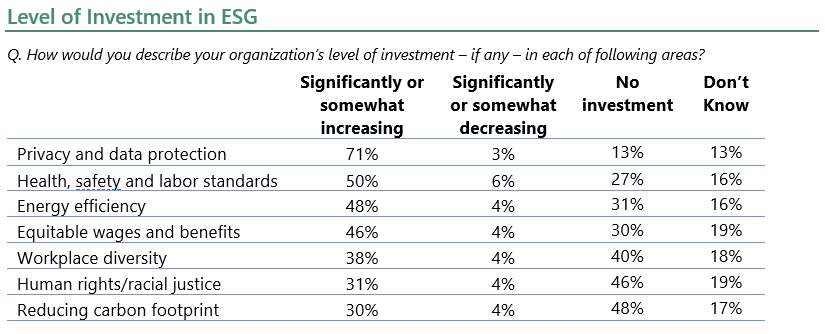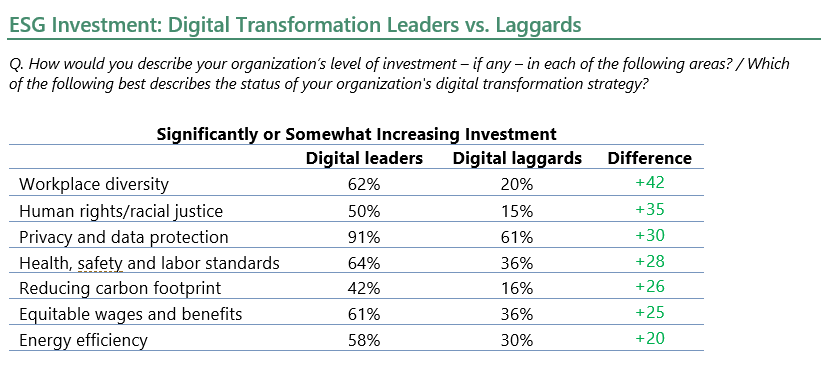
The pressure for businesses to be more environmentally and socially conscious has been ratcheted up. Recently, we looked at the impact an organization’s commitment to these kinds of initiatives can have on consumer brand choices.
To reiterate, in the business world these initiatives are called ESG – environmental, social and governance – and are treated as mandates for companies to actively address everything from climate change to diversity/inclusion to data privacy/protection. As with many other large-scale initiatives, some companies are attacking these issues head-on while others are lagging behind.
According to our Q2 2021 business trends survey, half (50%) of respondents say their organization has no formal ESG program and is not considering implementing one, and only 15% say they have a formal ESG program in place. These numbers seem unexpected until we break them down by company size.
ESG is more in the purview of larger enterprises (250+ employees) than smaller organizations (<250 employees). More than one-third (34%) of larger enterprises have a formal ESG program, while 22% say they do not. The rest are at different steps in between. Compare this with smaller organizations, where almost three-quarters (70%) say they have no formal ESG program and only 4% say they have a formal one.
Half (50%) of smaller organizations feel ESG is not relevant to their business, while only 17% of larger organizations feel that way. This is not surprising – many of the targets of public pressure over ESG-related issues are large corporations. As such, 62% of larger enterprises say their main driver for creating ESG programs is cultural pressure and the potential hit to their reputation. Another 41% say it ensures they’re in compliance with environmental regulations and other laws.
Similar to what we saw in our consumer results, privacy and data protection is getting the most attention from businesses, with 71% of respondents saying their organization is significantly or somewhat increasing their investment in this area. This is followed distantly by health, safety and labor standards (50%) and energy efficiency (48%).

Despite current conversations going on, reducing carbon footprints (30%), human rights/social justice (31%) and workplace diversity (38%) have the lowest levels of investment among the different areas of ESG. These do tend to be areas where many organizations have difficulty seeing the tangible benefits of implementing such initiatives.
The digital divide is certainly in play here, as well. Falling in-line with other recent survey results, we find digital transformation leaders perform higher across all ESG areas compared with digital transformation laggards. The biggest difference between the two involves investment in workplace diversity, as 62% of digital leaders are increasing investment compared with only 20% of digital laggards. Another big difference is in human rights/social justice initiatives, where digital laggards (15%) are again woefully behind digital leaders (50%).

The area where digital laggards (61%) have the strongest showing is in privacy and data protection, yet they are still well behind digital leaders (91%). Data privacy is the area that has the most tangible impact on a company’s reputation, thus it stands out as being top of mind across the largest swath of organizations.
Want insights on ESG trends delivered to your inbox? Join the 451 Alliance.

